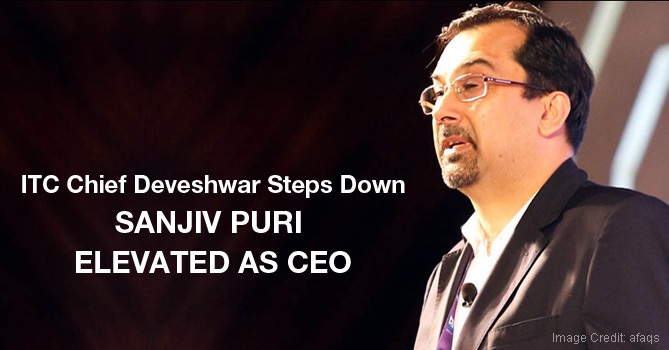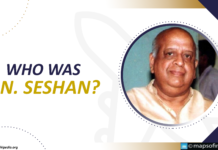ITC is not just another brand. Going from the Imperial Tobacco Company (established 1910) to the Indian Tobacco Company (1970) and to ITC in 1974, the company is an Indian icon which employs over 25,000 people in 60 offices across the country. Going from being a tobacco major to becoming a multi-business conglomerate with presence in hospitality, information technology, agriculture, packaged foods and FMCG, ITC is one of the groups that has left an indelible footprint in almost every sector.
The company has made a name for itself in employee retention and securing stakeholder interests. Much of the company’s philosophy comes from the great leadership it fosters and the dynamic heads who have taken the company ahead.
Sanjiv Puri – New CEO, ITC
Continuing the great legacy of all past Chief Executive Officers, Sanjiv Puri has now taken over from Yogesh C Deveshwar as the CEO of ITC on February 5, 2017. The corner office of Virginia House on Chowringhee Road, Kolkata, has a new occupant who brings with him the promise of taking forward the philosophy that has shaped this company.
This week, ITC’s board will consider a proposal to divide the responsibilities of the Executive Chairman’s position. If this comes through, Deveshwar, who has held the position since 1996, will now step down to the role of a non-executive chairman.
Puri’s Growth in ITC
In July 2016, Sanjiv Puri had been appointed the COO of ITC and was responsible for managing the daily operations of the group. He has also been the company’s Executive Director since 2015. Puri joined ITC in 1986 and has held several technical positions looking after engineering services.
Apart from serving as the Managing Director of ITC Infotech, the IT company of the group, he has also been the Divisional Chief Executive Director of the group’s FMCG division. Puri has seen the company through its transition from a tobacco and cigarettes major to a brand with pronounced interests in the country’s packaged goods and FMCG sectors. He has also served as the Managing Director of Surya Nepal, and Director of ITC Infotech UK and ITC Infotech USA.
Sanjiv Puri graduated from one of India’s famous engineering colleges, the Indian Institute of Technology in Kanpur and went on to become an alumnus of the Wharton School in Philadelphia. Puri is a perfectionist, a hands-on leader who has set about delving deep into the operations of all the businesses that form the building blocks of ITC.
In the short term he shall be mentored by Deveshwar, news reports say.
A Continuing Legacy
The transition from Y C Deveshwar to Sanjay Puri will indeed be a soft one, given Deveshwar’s continued presence as the non-executive Chairman, but change shall be a certainty. In his letter to the employees of ITC, Deveshwar said that he was more optimistic of the group’s future and prospects than he had ever been in the past.
This certainly translates into an assurance of continued efforts on the part of ITC to secure the best interests of the stakeholders, employees and customers. Changing times, however, will need changes in the style of management and a different approach as ITC stands at the threshold of yet another momentous transition.
Puri’s Plans And Challenges
With the dynamic and varied nature of the businesses ITC is into, Puri will certainly find his hands full. While the 2017-18 Union Budget has not caused any major turmoil in the cigarette business (which still remains ITC’s mainstay and greatest revenue earner), this trend may not continue in the long term. The company has to look at more avenues of diversification to remain on the growth track.
The hospitality industry is in the midst of a slowdown following the weak global growth trend and following India’s demonetisation drive. Much will be needed to plump ITC’s hotels up and revitalise this stream.
FMCG is another great revenue earner for ITC. Sanjiv Puri will now need to focus on taking on other titans such as Hindustan Unilever (HUL) and Nestle. Apart from this, Puri will also need to lay out a roadmap for ITC’s entry into the healthcare industry – a plan that has been in the pipeline for some time now. Non-FMCG streams like paper, matches and incense will also need to be made self-sustaining businesses.
Another major task that Mr Puri will now be looking at is implementing ITC’s Rs 25,000 crore capital expenditure plan. That is as big as it gets!
ITC’s Growth Story
According to news reports from last month, ITC’s net profit grew by 5.7 percent from Rs 2503.8 crore in Q3 2015 to Rs 2646.7 crore in the October to December quarter of 2016, beating market expectations despite demonetisation woes. Cigarette sales (growth of two percent) and sales of other consumer goods were far less than expectations due to the demonetisation drive undertaken by the government, analysts say.
The operating revenue of the company grew by about 4.5% YoY to Rs 13,470.89 crore. ITC’s performance in comparison to its main rival HUL has been impressive. With the remontetisation drive in full swing and with liquidity trickling back into the wallets of Indians, ITC’s growth should be back in full swing in the months to come. The group’s Q4 results should be worth waiting for. ITC stock closed on February 7, 2017 valued at Rs 276.95 at the NSE.





